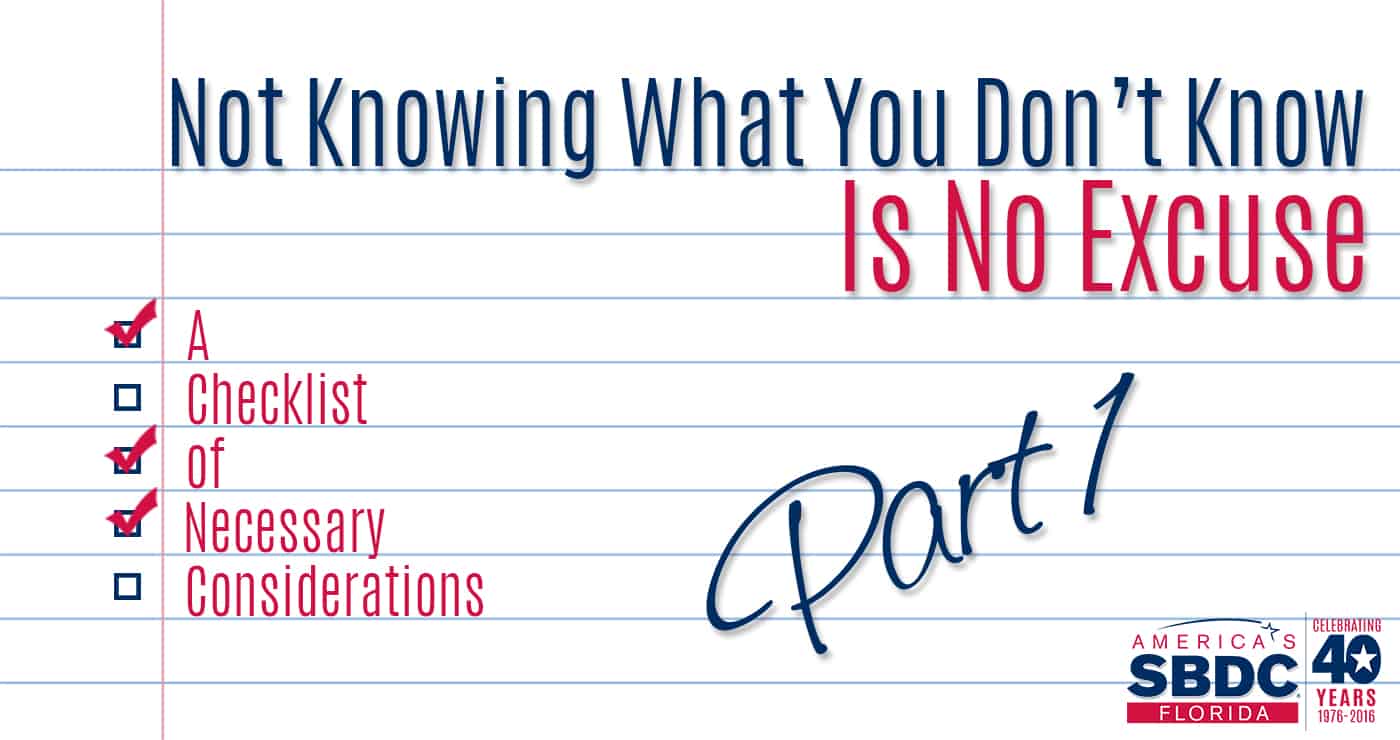Part 1: Not Knowing What You Don’t Know Is No Excuse
These Administrative Foundations Could Be Extra Insurance for Long-term Business Success
Many would-be business owners are so excited to be “starting a business” that they hastily “get married to” the idea of how much fun and freedom they will have. In addition, many hop into what they think will be a “fun time” to grow a company with a relative, friend or business colleague that they may have worked with in the past, or perhaps, to the contrary, someone who seems exciting and could be their “professional complement.”
The following represents the first of a three-part checklist of necessary considerations – taken from a small business case study – meant to serve as health prevention for a business. In this case, one of the entrepreneurs had little business knowledge of shareholder relationships and disastrous consequences of 50/50 ownership. Disregarding any of these could be very costly.
(Disclaimer: This is not meant to be an exhaustive list. Please consult a lawyer and CPA or for specific assistance.)
Lesson #1
No 50/50s. It’s a great sentiment to think that multiple parties in a legal relationship could be equal, but the practicality is that it doesn’t usually work. Lawyers will tell you that these situations are often doomed from the start. In certain instances, there may be an exception and this plan might work, but rarely. The plain truth is that as much as the parties provide a great deal of sweat equity to achieve success in the beginning, as revenue is generated, the worst in people comes out. Equal shareholder/member arrangements can lead to leadership dysfunction at the minimum and chaos and harmful legal issues at the extreme. Many scenarios can play out – one of the parties can get greedy and wants more money or maybe the two parties just simply disagree. In any case, the fallout is not pretty and can be very expensive. Remember, you can always hire the talent that you need rather than giving away portions of a company with people who aren’t good bets.
Lesson #2
Do reference checks. To ensure any business associates are who they seem to be, check out their past. Before you have a legally binding relationship with anyone and allow them access to money, professional relationships and other assets, this is a pre-emptive must. These days, Google is the first place to go (as well as other social media channels) to learn more about anybody. Check references as you would any employee before handing over a portion of your business to them. Look for red flags such as prior bankruptcies, numerous prior companies of employment or ownership, criminal records, etc. You may want to hire a firm to do a background investigation if your potential partners/shareholders/members are unknown to you. Spend time with their family members/friends/associates. In many countries, potential business partners will have dinner with the intended new associate, or, at the very least, plan a social experience to learn more about how they handle new relationships and to meet family members. This can be very revealing and can provide clues to future problems. In business, as in marriage, the family and emotional baggage comes with the person.
Lesson #3
Construct a good shareholders’ and/or operating agreement and include a non-compete agreement when you are forming a legal business relationship with others. Be sure to include any buy/sell clauses for the future. You may want to exclude spouses or family members from “inheriting into” the business should one of the owners die or become disabled. This is where a good business attorney can assist you. The best time to construct all the legal implications is before the business begins transactions.






Karen E. Krymski
Consultants, Government Contracting Consultants, Krymski, TampaFlorida PTAC at USF, Tampa
Specialty: Procurement, Marketing
Karen Krymski has more than 20 years of experience as an entrepreneur, owning a firm that specialized in marketing, business development, public affairs, organizational leadership and strategic planning. Clients ranged from start-up small businesses to Fortune 500 companies (gold emblem brands). Her company was retained to assist in achieving clients’ strategic direction, branding and revenue goals and most retained her firm for successful execution following the planning process. Krymski’s industry knowledge spans a broad range and includes medical (behavioral health, physician practices and home healthcare) and dental; utilities (water, wastewater, solid waste and recycling); and retail promotions. She built a successful federal government business pipeline for a women-owned IT security company and also founded a local chapter of a national women’s business organization, achieving 350 invested members within a four year period. She earned a bachelor’s in health education and a master’s in public health planning from the University of Pittsburgh and completed a hospital administrative residency in Fort Myers. In 2007, she was honored as the Managing Director of the Year by eWomenNetwork, was a finalist in 2008 for the Tampa Bay Business Journal’s Businesswoman of the Year and was awarded the Iconic Woman award in 2012 from the St. Petersburg Chamber of Commerce.